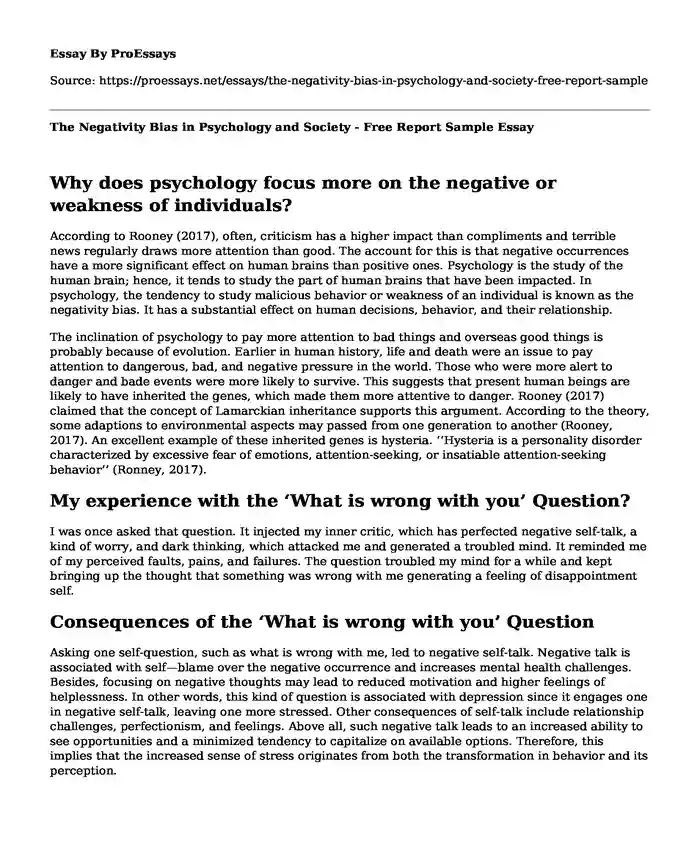Why does psychology focus more on the negative or weakness of individuals?
According to Rooney (2017), often, criticism has a higher impact than compliments and terrible news regularly draws more attention than good. The account for this is that negative occurrences have a more significant effect on human brains than positive ones. Psychology is the study of the human brain; hence, it tends to study the part of human brains that have been impacted. In psychology, the tendency to study malicious behavior or weakness of an individual is known as the negativity bias. It has a substantial effect on human decisions, behavior, and their relationship.
The inclination of psychology to pay more attention to bad things and overseas good things is probably because of evolution. Earlier in human history, life and death were an issue to pay attention to dangerous, bad, and negative pressure in the world. Those who were more alert to danger and bade events were more likely to survive. This suggests that present human beings are likely to have inherited the genes, which made them more attentive to danger. Rooney (2017) claimed that the concept of Lamarckian inheritance supports this argument. According to the theory, some adaptions to environmental aspects may passed from one generation to another (Rooney, 2017). An excellent example of these inherited genes is hysteria. ‘‘Hysteria is a personality disorder characterized by excessive fear of emotions, attention-seeking, or insatiable attention-seeking behavior’’ (Ronney, 2017).
My experience with the ‘What is wrong with you’ Question?
I was once asked that question. It injected my inner critic, which has perfected negative self-talk, a kind of worry, and dark thinking, which attacked me and generated a troubled mind. It reminded me of my perceived faults, pains, and failures. The question troubled my mind for a while and kept bringing up the thought that something was wrong with me generating a feeling of disappointment self.
Consequences of the ‘What is wrong with you’ Question
Asking one self-question, such as what is wrong with me, led to negative self-talk. Negative talk is associated with self—blame over the negative occurrence and increases mental health challenges. Besides, focusing on negative thoughts may lead to reduced motivation and higher feelings of helplessness. In other words, this kind of question is associated with depression since it engages one in negative self-talk, leaving one more stressed. Other consequences of self-talk include relationship challenges, perfectionism, and feelings. Above all, such negative talk leads to an increased ability to see opportunities and a minimized tendency to capitalize on available options. Therefore, this implies that the increased sense of stress originates from both the transformation in behavior and its perception.
Value of Criticism in Society
When society looks at the wrong of someone it makes one feel condemned. Condemnation serves as a social tool that criticizes bad habits, acts, or behavior. It helps society let one know that such negative character or conduct is against social norms and culture's values. Besides, society uses it as assaultive (Rooney, 2017). Through condemning a harmful habit, society may desire to see the person squirm or show some other sign of suffering, such as facing shame.
Further, it may serve a social and communicative role in that public displays of suffering can provide a form of discouragement to would-be offenders and can solidify the community through an expression of a boundary: These acts will not be stomached (Rooney,2017). Above all, condemnations serve as an ambivalent in association with the emotion of anger. Condemnation offers authoritative support to the expression of vindictive feelings, anger, and moral dominancy in particular circumstances where, for the most part, such feelings, in a regular social relation, are frequently hidden.
References
Rooney, A. (2017). Psychology: From spirits to psychotherapy, tracing the mind through the ages (How the World Works). Arcturus Publishing Ltd.
Cite this page
The Negativity Bias in Psychology and Society - Free Report Sample. (2023, Dec 30). Retrieved from https://proessays.net/essays/the-negativity-bias-in-psychology-and-society-free-report-sample
If you are the original author of this essay and no longer wish to have it published on the ProEssays website, please click below to request its removal:
- Unconditional Love Song
- Essay Sample on the Ability of Money in Buying Happiness
- Crime and Mental Illness Essay
- Research Paper on Transitional Nursing and Combating Veteran PTSD and Depression
- Aggression in Teenagers and Treatment Essay
- Forced Marriages in Cambodia Paper Example
- Research Paper on Schizophrenia and Bipolar Mania







